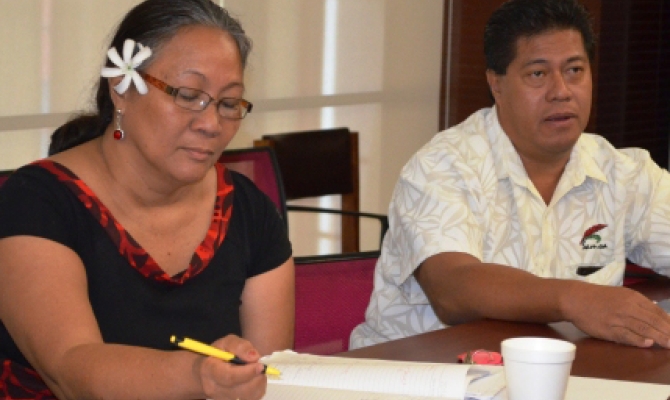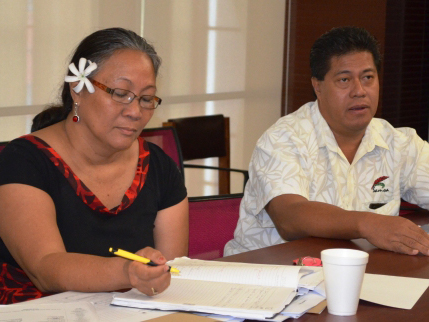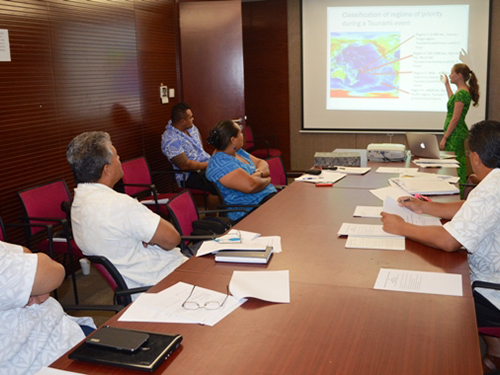
Climate Change Resilience
Samoa Quality Broadcasting and the Samoa Ministry of Communications Information Technology are undergoing training this month to help develop a National Broadcasters' Climate and Disaster Resilience Plan.
This is part of an initiative funded by the Pacific Media Assistance Scheme (PACMAS) and implemented by the Secretariat of the Pacific Regional Environment Programme (SPREP) in partnership with the Secretariat of the Pacific Community (SPC) and the National Disaster Management Office of Samoa.
As part of the National Broadcasters' Climate and Disaster Resilience Plan Project (BCDRP), broadcasters from eight Pacific island countries will undergo training to develop plans and Standard Operating Procedures to be used in times of emergencies between the broadcasters and the national disaster management office. The project will also provide training for their news teams on how to report on disasters and climate change.
Selected by the Pacific Media Assistance Media Scheme, this project follows on from a regional activity hosted in Samoa in 2012 which saw the broadcasters come together to learn more about how to start developing their emergency plans.

"Overall the aim for this plan is so that our broadcasters can continue to share timely information to our communities, in particular during times of emergencies, so our communities can prepare and respond accordingly," said Ms. Filomena Nelson, Assistant CEO of the Disaster Management Office of Samoa.
"We fully value the crucial role broadcasters have during times of natural disasters and we look forward to strengthening our working relationship with them."
A range of different activities will take place under this project, aside from consultation meetings between stakeholders there will also be several workshops held to help draft the Climate and Disaster Resilience Plan and Standard Operations Procedures.
"We're pleased to work in partnership with the National Disaster Management Office of Samoa, Secretariat of the Pacific Community, PACMAS and the broadcasters - all partners have come together to help this happen, not only in Samoa but also seven other Pacific island countries," said Dr. Netatua Pelesikoti, Director of Climate Change, SPREP.

It's a valuable initiative given our vulnerability to natural and man-made hazards and the important role media plays in communicating timely and clear information and instructions."
The National Broadcasters Climate and Disaster Resilience Plan Project will work with broadcasters from eight Pacific islands selected by PACMAS: the Cook Islands, Palau and Marshall Islands, Kiribati, Samoa, Solomon Islands, Tonga, Tuvalu and Vanuatu will be part of this project.
Outcomes of this project include the development of climate and disaster resilience plans, training to help them implement the plan, development of Standard Operating Procedures as well as training for their news teams to help them better report on disasters and climate change.
If successful, it is hoped that these activities can be extended to reach other Pacific island countries and broadcasters as well.
For more information on this project please contact: SPREP: Ms. Nanette Woonton, Media and Public Relations Officer, [email protected]; SPC: Dr Kirstie Méheux, Senior Adviser, Disaster Risk Management Training and Professional Development, [email protected]
This is part of an initiative funded by the Pacific Media Assistance Scheme (PACMAS) and implemented by the Secretariat of the Pacific Regional Environment Programme (SPREP) in partnership with the Secretariat of the Pacific Community (SPC) and the National Disaster Management Office of Samoa.
As part of the National Broadcasters' Climate and Disaster Resilience Plan Project (BCDRP), broadcasters from eight Pacific island countries will undergo training to develop plans and Standard Operating Procedures to be used in times of emergencies between the broadcasters and the national disaster management office. The project will also provide training for their news teams on how to report on disasters and climate change.
Selected by the Pacific Media Assistance Media Scheme, this project follows on from a regional activity hosted in Samoa in 2012 which saw the broadcasters come together to learn more about how to start developing their emergency plans.

Above: CEOs of Samoa Quality Broadcasting and the Ministry of Communications and Information Technology of Samoa
"Overall the aim for this plan is so that our broadcasters can continue to share timely information to our communities, in particular during times of emergencies, so our communities can prepare and respond accordingly," said Ms. Filomena Nelson, Assistant CEO of the Disaster Management Office of Samoa.
"We fully value the crucial role broadcasters have during times of natural disasters and we look forward to strengthening our working relationship with them."
A range of different activities will take place under this project, aside from consultation meetings between stakeholders there will also be several workshops held to help draft the Climate and Disaster Resilience Plan and Standard Operations Procedures.
"We're pleased to work in partnership with the National Disaster Management Office of Samoa, Secretariat of the Pacific Community, PACMAS and the broadcasters - all partners have come together to help this happen, not only in Samoa but also seven other Pacific island countries," said Dr. Netatua Pelesikoti, Director of Climate Change, SPREP.

Above: Learning about the protocol for issuing tsunami warnings in Samoa
It's a valuable initiative given our vulnerability to natural and man-made hazards and the important role media plays in communicating timely and clear information and instructions."
The National Broadcasters Climate and Disaster Resilience Plan Project will work with broadcasters from eight Pacific islands selected by PACMAS: the Cook Islands, Palau and Marshall Islands, Kiribati, Samoa, Solomon Islands, Tonga, Tuvalu and Vanuatu will be part of this project.
Outcomes of this project include the development of climate and disaster resilience plans, training to help them implement the plan, development of Standard Operating Procedures as well as training for their news teams to help them better report on disasters and climate change.
If successful, it is hoped that these activities can be extended to reach other Pacific island countries and broadcasters as well.
For more information on this project please contact: SPREP: Ms. Nanette Woonton, Media and Public Relations Officer, [email protected]; SPC: Dr Kirstie Méheux, Senior Adviser, Disaster Risk Management Training and Professional Development, [email protected]